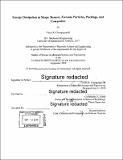Energy dissipation in shape memory zirconia particles, packings, and composites
Author(s)
Champagne, Victor K.,III(Victor Kenneth)
Download1135982424-MIT.pdf (6.690Mb)
Other Contributors
Massachusetts Institute of Technology. Department of Materials Science and Engineering.
Advisor
Christopher A. Schuh.
Terms of use
Metadata
Show full item recordAbstract
This research project lies at the intersection of two classes of materials, namely superelastic materials and granular materials, each known for their ability to dissipate large amounts of kinetic energy. Because of their energy-absorbing properties, superelastic granular materials are of interest for development into applications involving force protection. Quasi-static, closed-die compression tests were conducted on granular packings of ceria-doped zirconia, a material which is well-known to exhibit shape memory and superelastic behavior. The doping level of ceria in the zirconia system was controlled to experimentally determine the mole percent for optimal energy dissipation in a granular packing. Various particle size distributions were selected to study mechanisms of energy dissipation in a granular packing including particle friction, fracture, and martensitic phase transformation. To study the behavior of encapsulated shape memory and superelastic zirconia particles, composites were fabricated using polyurea as a matrix material, and the bonding between the zirconia particles and polyurea matrix was studied along with mechanical properties. Finally, the effect of high strain rate impact was observed on ceria-doped zirconia pellets using laser induced particle impact testing (LIPIT) which launches single, micron-sized particles at high velocities. This thesis provides further insight into the mechanical behavior of granular superelastic ceramics under different constraints and loading conditions while optimizing for energy dissipation.
Description
Thesis: S.M., Massachusetts Institute of Technology, Department of Materials Science and Engineering, 2019 Cataloged from PDF version of thesis. Includes bibliographical references (pages 47-49).
Date issued
2019Department
Massachusetts Institute of Technology. Department of Materials Science and EngineeringPublisher
Massachusetts Institute of Technology
Keywords
Materials Science and Engineering.